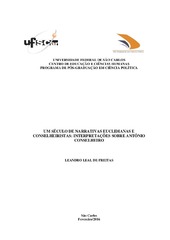| dc.contributor.author | Freitas, Leandro Leal de | |
| dc.date.accessioned | 2016-10-20T13:55:39Z | |
| dc.date.available | 2016-10-20T13:55:39Z | |
| dc.date.issued | 2016-02-26 | |
| dc.identifier.citation | FREITAS, Leandro Leal de. Um século de narrativas euclidianas e conselheiristas : interpretações sobre Antônio Conselheiro. 2016. Dissertação (Mestrado em Ciência Política) – Universidade Federal de São Carlos, São Carlos, 2016. Disponível em: https://repositorio.ufscar.br/handle/ufscar/7949. | * |
| dc.identifier.uri | https://repositorio.ufscar.br/handle/ufscar/7949 | |
| dc.description.abstract | This study aimed to understand, organize, line out, interpret and classify the different
discursive arrays that have been placed to interpret and explain the historical figure of
Antônio Conselheiro, who was distinguished as a determining character in an exponential
time of Brazilian history, the war of Canudos. In this manner, we intend to link this analysis
to the field of Brazilian Political-Social Thought, using the theoretical and methodological
perspective of linguistic contextualism (Quentin Skinner, John Pocock), seeking to understand
in which way the political thoughts coming from the interpreters manifest in the narratives
built by themselves about Conselheiro (in the inter-relationship between author, text and
context). It was opted to cut the analysis of the two most evident interpretative canons: the
“euclideana” tradition, inspired by the narrative constructed by Euclides da Cunha in Os
Sertões (from which derives the “euclideana” denomination) and the historiographical
revisionism, initiated by the mid-twentieth century, having as major name the historian José
Calasans - establishing it as an interpretive inflection, also called "Canudos not euclideano"
(from which derives the “conselheirista” denomination). Thus, we conclude that, roughly
speaking, the division between euclidiana and conselheirista discourses and characters is not
rigid, nor aware of embracing the entire complex and contrasting narratives about the War of
Canudos and Conselheiro, presenting in some points flagrant interpretative differences even
within the same group. In that direction, this scission proved to be inaccurate (and partial at
times), constituting basically just as thematic preference, as if they were formed two "research
lines" about the same subject, which have different goals and approaches between itself - thus
generating different (or even divergent) results also. | eng |
| dc.description.sponsorship | Não recebi financiamento | por |
| dc.language.iso | por | por |
| dc.publisher | Universidade Federal de São Carlos | por |
| dc.rights.uri | Acesso aberto | por |
| dc.subject | Antônio Conselheiro | por |
| dc.subject | Matrizes discursivas | por |
| dc.subject | Interpretações | por |
| dc.subject | Euclidianos | por |
| dc.subject | Conselheiristas | por |
| dc.subject | Discursive errays | eng |
| dc.subject | Interpretations | eng |
| dc.title | Um século de narrativas euclidianas e conselheiristas : interpretações sobre Antônio Conselheiro | por |
| dc.type | Dissertação | por |
| dc.contributor.advisor1 | Cepêda, Vera Alves | |
| dc.contributor.advisor1Lattes | http://lattes.cnpq.br/4917331423373631 | por |
| dc.description.resumo | Este trabalho teve por objetivo compreender, organizar, esboçar, interpretar e classificar as
diferentes matrizes discursivas que se colocaram a interpretar e explicar a figura histórica de
Antônio Conselheiro, notabilizado enquanto personagem determinante de um momento
exponencial da história brasileira, a guerra de Canudos. Destarte, pretendemos vincular esta
análise ao campo do Pensamento Político-Social Brasileiro, utilizando-nos da perspectiva
teórico-metodológica do contextualismo linguístico (Quentin Skinner, John Pocock),
buscando compreender em que medida se manifesta o pensamento político dos intérpretes nas
narrativas por eles construídas sobre o Conselheiro (na inter-relação entre autor, texto e
contexto). Optamos por recortar a análise aos dois cânones interpretativos mais evidentes: a
tradição euclidiana, inspirada na narrativa construída por Euclides da Cunha em Os Sertões
(de onde derivaria a denominação de euclidiano); e o revisionismo historiográfico, iniciado
por volta da metade do século XX, tendo como principal nome o historiador José Calasans –
constituindo-se enquanto uma inflexão interpretativa, também chamada de “Canudos não
euclidiano” (de onde derivaria a denominação de conselheirista). Assim, concluiremos que, a
grosso modo, a divisão existente entre euclidianos e conselheiristas não é rígida, nem
tampouco dá conta de abarcar todas as complexas e por vezes contrastantes narrativas
existentes a respeito da guerra de Canudos e do Conselheiro, às vezes apresentando flagrantes
divergências interpretativas até mesmo dentro do mesmo grupo. Nesse sentido, essa cisão se
mostrou imprecisa (e, por vezes, parcial) constituindo-se, basicamente, apenas enquanto
preferência temática, como se fossem formadas duas “linhas de pesquisas” sobre um mesmo
tema, as quais teriam objetivos e enfoques diferentes entre si – gerando, assim, resultados
também diferentes (e até divergentes). | por |
| dc.publisher.initials | UFSCar | por |
| dc.publisher.program | Programa de Pós-Graduação em Ciência Política - PPGPol | por |
| dc.subject.cnpq | CIENCIAS HUMANAS::CIENCIA POLITICA | por |
| dc.ufscar.embargo | Online | por |
| dc.publisher.address | Câmpus São Carlos | por |
| dc.contributor.authorlattes | http://lattes.cnpq.br/1218033742524491 | por |
